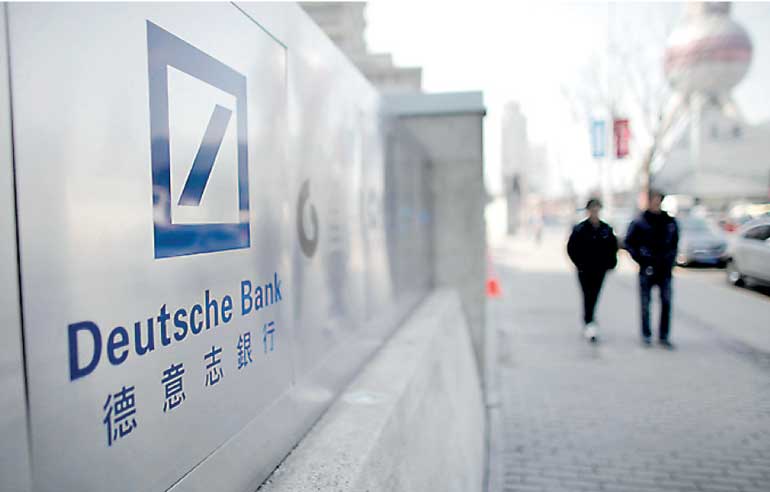Friday Feb 20, 2026
Friday Feb 20, 2026
Friday, 1 January 2016 00:00 - - {{hitsCtrl.values.hits}}
 A Deutsche Bank sign is seen outside of a corporate building in Shanghai’s financial district in this February 23, 2011 file photo. Chinese authorities are starting to police the nation’s foreign exchange market in a way currency traders have rarely seen before, levying penalty payments for aggressive trading and prompting some banks to turn down business. Reuters reported on December 31, 2015 that China’s central bank had suspended at least three foreign banks from conducting some of their foreign exchange business until the end of March. REUTERS
A Deutsche Bank sign is seen outside of a corporate building in Shanghai’s financial district in this February 23, 2011 file photo. Chinese authorities are starting to police the nation’s foreign exchange market in a way currency traders have rarely seen before, levying penalty payments for aggressive trading and prompting some banks to turn down business. Reuters reported on December 31, 2015 that China’s central bank had suspended at least three foreign banks from conducting some of their foreign exchange business until the end of March. REUTERS
Reuters: China’s central bank has suspended at least three foreign banks from conducting some foreign exchange business until the end of March, three sources who had seen the suspension notices told Reuters on Wednesday.
Included among the suspended services are liquidation of spot positions for clients and some other activities related to cross-border, onshore and offshore businesses, the sources said.
The sources, speaking on condition that the banks were not named, said the notices sent to the affected foreign banks by the People’s Bank of China (PBOC) gave no reason for the suspension.
The PBOC did not immediately respond to a request for comment.
The measure follows a slew of steps taken by the Chinese government to keep the yuan stable since it devalued the currency in August.
The spread between the onshore and offshore markets for the yuan, or renminbi, has been growing since the devaluation, making it increasingly difficult for the central bank to manage its currency and stem an outflow of capital from an economy that is facing its slowest growth in 25 years.
The sources told Reuters that authorities had warned the banks that if they engaged in lucrative carry trade, taking advantage of the different exchange rates, the central bank would move to further block arbitrage channels.
“This is part of the PBOC’s expedient means to stabilize the yuan’s exchange rate,” said an executive at a foreign bank contacted separately.
The sources said the banks might have been targeted due to the large scale of their cross-border forex businesses.
An economist at a top government think-tank said the measure was a temporary bid to curb demand for dollars that has been strengthening towards the end of the year as the gap between the onshore and offshore yuan exchange rates widens.
“They hope to ease foreign exchange buying pressure and ease depreciation pressure on the yuan,” said the economist who declined to be identified by name. “But I don’t think the authorities will take very strong capital control measures, they are likely to reinforce the existing measures.”
The move could also ease pressure on the PBOC for direct intervention in offshore markets to support the yuan, which has contributed to a fall of more than $400 billion in China’s foreign exchange reserves this year.
In common with forex markets worldwide, there are no official data on which banks are the most active in trading foreign exchange in China.
A 2015 Asiamoney survey asking market participants which brokers they used named Deutsche Bank as the top foreign forex provider in China, followed by Australia and New Zealand Banking Group, HSBC, Citigroup and BNP Paribas.